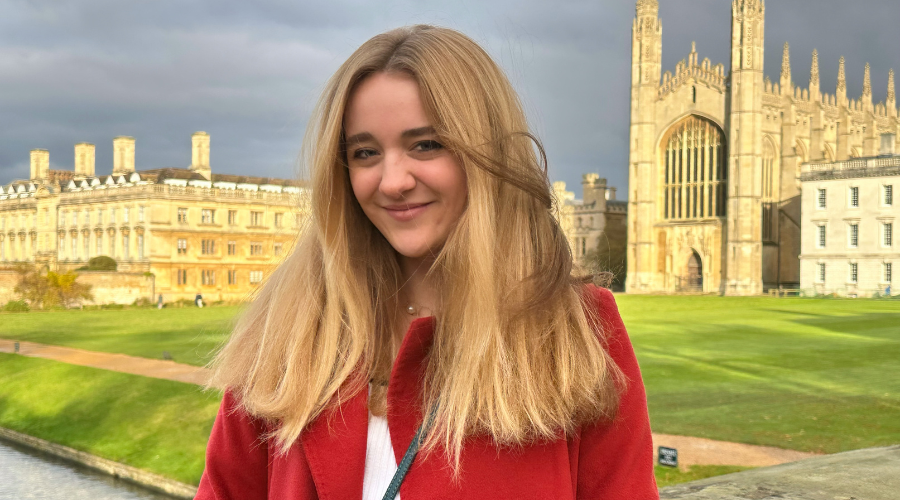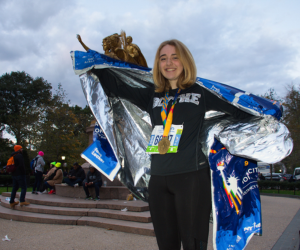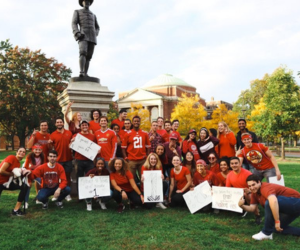Q&A with Blythe Edwards ‘21GS, JD/LLM Candidate in the Harvard and University of Cambridge Joint Degree Program
Blythe Edwards ‘21GS shares how her time in the Dual BA inspired her to pursue another unconventional, uniquely rewarding educational experience in the law.

After a globe-trotting upbringing, Blythe Edwards ‘21GS sought and found an international undergraduate experience in the Dual BA. Now as an alumna pursuing the law, Edwards has once again chosen a continent-spanning, unconventional path as a JD/LLM candidate in the Harvard Law School and University of Cambridge Joint Degree Program. Edwards shares her perspective on the rewards of unconventional education, including her favorite memories from campuses in France, the United States, and England.
Majors: Politics and government; political science
Sciences Po campus: Reims
What is your GS story?
I was born in California, but grew up abroad. My childhood was spent between London, Dubai, Paris, and Hong Kong.
When applying to universities, I was torn between programs in the United States and Europe. I wanted both to be part of an internationally-minded community and to experience living in the United States. I was fascinated by both European and American politics and systems of government, and that interest had grown even stronger through the turbulence of the Brexit referendum and the 2016 election. The Dual BA program felt almost tailor-made for my background and interests. Spending two years studying in both France and the United States offered the opportunity to get on-the-ground insights and a deep perspective on each country’s dynamics.
I also had fond memories of living in Paris as a pre-teen and went on to do a bilingual International Baccalaureate high school diploma. Sciences Po appealed to me because in addition to being one of the top political science universities in Europe, it was a wonderful chance to live in France as an adult and improve my French language skills. Meanwhile, the School of General Studies promised to be an incredible way to experience studying at one of the best schools in the country and living in America for the first time. Columbia felt right for me from the first time I visited the campus. I love big cities, and New York has always been one of my favorites.
Ultimately, I chose the Dual BA because I knew it would challenge me more than any of the other undergraduate programs I was considering. Attending both Sciences Po and Columbia, you get not only academic rigor, but must also adapt to two completely different places and pedagogical styles.
What were some highlights of your Dual BA experience?
Sciences Po Reims had a remarkably tight-knit and international community of students. The academic intensity combined with the relatively small, enclosed campus meant that we got to know each other and bonded quickly. The campus’s social life was entirely student driven—we regularly hosted dinner parties and gatherings in our apartments, with home-cooked meals supplemented by boulangerie-bought pastries and baguettes.
Life in Reims holds a certain charm—the historic Jesuit College campus, the regular formal-dress galas held in nearby Champagne houses and Chateaus, the bustling Christmas market in front of the spectacular Reims cathedral… In the second year, I lived in a building of four two-bedroom apartments with eight friends, overlooking a medieval Basilica. On my short walk to campus I would pass by three boulangeries. Living in France also offered wonderful travel opportunities—we managed long weekends in Paris, Lisbon, London, Lyon, and Marrakesh, among others.

Transitioning to Columbia felt like everything had been super-sized. Two years in a sleepy city of fewer than 200,000 people made the Big Apple even more thrilling. A favorite memory from my time at Columbia was training for and running the 2019 New York City Marathon in my first semester. It was a really fun way to get to know New York. I would run everywhere rather than taking the subway. It got me to explore so many parts of New York I might not have otherwise encountered.
Another highlight was interning part-time at CBS News’s Political Unit in my second semester. I stacked all my classes on two days of the week and would work in-person at the CBS headquarters three days, helping to cover the 2020 Democratic primaries. I loved combining the student experience, while feeling like a professional; it's the type of opportunity only on offer in places like New York, and what gives Columbia such an edge. At the time I was in a couple political science seminars and it was fun to combine the academic theory with on-the-ground observations.
What drew you to law and to your current law program? & what specific interests or goals do you have within the law field?
For those of us in the class of 2021, the pandemic suddenly hit spring break of our junior year. I never returned to a Columbia classroom. I think having my American education truncated by the pandemic was probably the reason I decided to go straight to law school. It didn’t feel like my US life experience was complete yet. I see a law degree as being a remarkably option-expanding choice. You can do so much with a JD, go into virtually any field of business, be it politics, government, or academia.
Law school had some of the same appeal as the Dual BA program. The academic demands push you to go beyond what you thought you were capable of, and, when you look back, it’s satisfying to see the hockey-stick shape of your learning curve.
After I graduate from law school, I will spend one year clerking for a judge on the Ninth Circuit. After that, I will go home to London—my favorite city—to practice as a US-qualified lawyer at an international law firm.
Can you explain a bit about your unique Harvard/Cambridge program? How does this dual educational experience compare to the Dual BA?

The Harvard Law School (HLS)-Cambridge JD/LLM Joint Degree Program was actually one of the reasons Harvard was my top choice for law school. In the program, students spend two years at Harvard Law. Then, rather than a traditional third year of law school, participants spend one academic year at Cambridge, before returning to Harvard for a final semester, graduating with both LLM (masters in law) and JD degrees.
It may have been the post-pandemic endorphins of being back in-person among peers, but I have been incredibly happy in law school. My “section” (the group of 80 students with whom you take all your first year classes) developed a wonderful sense of camaraderie, and I made many life-long friends. In that first year of law school I worked harder and experienced the most concentrated intellectual and personal growth of my life.
Because I was so comfortable with my community and opportunities at Harvard, it turned out to be a really tough decision to leave for the third year. It was the Columbia-Sciences Po experience that convinced me I should launch into an entirely new educational experience, knowing how much I would get out of it and that it was likely my last chance to do so.
“It was the Columbia-Sciences Po experience that convinced me I should launch into an entirely new educational experience, knowing how much I would get out of it.”
I’ve been able to stay close to my HLS cohort through texts, calls, postcards and trans-Atlantic visits. Once again, the Dual BA provides a great template, having kept in touch with Sciencepiste friends who went on to places other than Columbia.
The year-long LLM program has thus-far been wonderful. Cambridge has a special magic that comes from its many centuries of traditions. From candlelit formal dinners (imagine everyone dressed in Harry Potter-like robes, sitting at long tables in great halls), to sublime evensong services in our college chapel (founded in 1157!), to lively debates and speaker events at the Cambridge Union, to early-morning rowing on the River Cam for my college—I’m so grateful for the opportunity to experience some of the ancient customs, institutions, and quirks. There is also a good choice of libraries where I can while away the hours on my law studies, which focus on English and international law.
How did the Dual BA and GS’s nontraditional educational opportunities prepare you for or inform your law pursuits?
The Dual BA program is an excellent preparation for law school, and the HLS admissions office seems to agree based on the number of us there. I found that my education at Sciences Po and Columbia prepared me in different, complementary ways.
In hindsight I see that Sciences Po was great preparation for law school process-wise. The French style trains you to think in a very analytical way—in a way that is much more rigorous than I have experienced before or afterwards. Your arguments must be constructed and structured according to an extremely strict, formalized method. Moreover, the intensity and endurance of the Sciences Po experience was good training for law school; having to juggle multiple classes on wide-ranging subjects, not getting to choose all your classes, the 4-hour hand-written exams, and even the often seemingly arbitrary, black-box nature of the grading.
“It is amazing what a strong bond the shared Dual BA experience builds.”
For me, never having been educated under a US curriculum, Columbia was an extremely helpful introduction to the American pedagogical style. It also provided a substantive introduction to US legal education. I took then-President Bollinger’s First Amendment class, which he taught as a traditional black-letter law class. That experience helped to rip off the bandaid and relieve my anxieties about the cold-calling law school system.
Harvard Law currently has a wonderful contingent of Dual BA alumni. There are four other Dual BA women in the HLS class of 2024. Last year we organized regular dinners together, and while we come from different graduation years and Sciences Po campuses, it is amazing what a strong bond the shared Dual BA experience builds.
What advice would you have for current GS students, especially fellow Dual BA students, who are interested in law school?
To current GS students interested in law school, I would say first, consider taking time off before law school. It is more common than not. It's a chance to gain different experiences and perspectives, making you a more interesting candidate and future lawyer. However, if you are a nontraditional student who has already gotten life experience beyond college, or if you are certain about law school, starting immediately after undergrad may be a better path and could give you time to do a clerkship after law school without feeling like you are postponing your career too long.
Second, when it comes to internships and jobs, don't box yourself into "law" roles just to impress law schools. Admissions deans aren't looking for a resume full of legal work. Instead, focus on what genuinely interests you. Whether it's a unique job, volunteering, or an unusual project, these experiences make you stand out and show law schools (and future employers) who you really are.
Finally, when you apply, lean into your strengths. Show the admissions team why you are ready to excel in a demanding, resource-rich environment. They want to admit students who will thrive and make the most of the opportunities, so be upbeat in your essays.
In short, make your journey to law school uniquely yours. Take the time to explore, and choose experiences that excite you, not just ones you think you should do. This approach will not only make your law school application stronger but also enrich your career and life in the long run.
